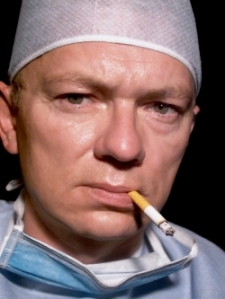(Full disclosure: Dr. Mojtabai kindly furnished a copy of his article for review. I don’t think this freebie altered my judgement but then, no one ever does.)
A new study shows that 3/5ths of those diagnosed with depression don’t have Major Depressive Disorder. Damning proof America’s mental health system is riddled with quacks, right? Actually, no. But it suggests a worrisome disconnect between those with mild depressive symptoms and those trained to treat them.
Ramin Mojtabai of the Johns Hopkins Bloomberg School of Public Health studied 5,639 adults who reported, “a doctor or other medical professional,” diagnosed them with depression in 2009 or 2010. He found only 38.4% had met criteria for a major depressive episode in the past twelve months. Nearly three-quarters of those who did not meet criteria had been prescribed medication.
Who’s making these diagnoses? Probably primary care doctors – the people we’re most likely to talk to if we gain weight, lose energy or have trouble sleeping. In 2011, Mojtabai found 7% of all doctor visits involved a prescription for antidepressants.[i] For his current study, he started with data collected through the United States National Survey of Drug Use and Health. While this study didn’t ask participants what type of medical professional diagnosed them, he found only 34.6% of those who hadn’t met criteria for a major depressive episode received outpatient mental health services. It’s not much of a leap to surmise primary-care doctors are responsible – especially considering Mitchell and Vaze’s 2009 study, which found such doctors misdiagnosed depression more often than they identified it correctly.[ii]
Is it a problem if family doctors reach for a quick fix when they encounter mild-to-subclinical depression? Per the studies Mojtabai cites, there’s little evidence antidepressants help such cases. Effective treatments include a referral to counseling, advice on boosting one’s mood with diet and exercise, or watchful waiting. Instead of these, three-quarters of those with only mild depressive symptoms got a prescription.
Three possible solutions come to mind. None would be quick, easy or cheap.
1. Better training in diagnosis
If misdiagnosis is the problem, more training is the answer, right? Bear in mind, for every public health problem, the initial thought is, “Let’s get the primary care doctors on the case.” Family doctors are expected to follow up on everything from lead exposure to trampoline safety. Depression has to compete with every other disease in need of greater public awareness.
2. Counter-programming
Primary care doctors are barraged by pharmaceutical companies which promise quick and easy solutions, based on often-dubious research. Olfson and Marcus found antidepressant use doubled from 1996 to 2005. In the same period, the number of patients who received therapy as well as antidepressants dropped by a third.[iii] (Essay question: Should we allow unscrupulous Big Pharma to exploit human suffering by placing profit ahead of facts and the public’s health, or should jackbooted government thugs trample free speech by placing unaccountable technocrats in charge?)
Organizations such as the American Counseling Association and the American Psychology Association should return fire with their own brochures. On the front cover: fit, attractive people of all ages and cultures beaming over the success of their non-pharmaceutical treatment. Inside: large-print bullet-points on how to differentiate the different intensities of depression, and the relative efficacy of medication, lifestyle improvements and counseling. Last page: a handy list of local therapists for referrals.
3. A nationwide program
In his article, Mojtabai mentions the United Kingdom’s National Health Services’ “Improving Access to Psychological Therapies“. This program trained thousands in cognitive-behavioral therapies and provided general practitioners with free on-line training about depression. As a result, patients move easily from a more-accurate diagnosis to a simpler referral for help.
In the U.S., surveys show we dislike government programs and government spending, but we do like the benefits that spending on government programs brings. Per NHS data, their big-government program moved 45,000 workers off public benefits by getting them back to work. It also benefited the UK’s economy by an estimated £272,000,000 by preventing the need for more expensive treatments. The program has been criticized for restricting the range of therapies available and providing lightly-trained staff. Even with these limitations, it has delivered a respectable (if non-astonishing) recovery rate of 42.5%.
For the next go-round:
Mojtabai’s study is enticingly exasperating; the kind that raises more questions than it answers. Tough questions for a follow-up:
1. Exactly who provides these misdiagnoses? Which specialty is most on-target, and which is most likely to misdiagnose? Master’s-level counselors, social workers and psychologists should all be assessed for accuracy.
2. Out of the patients who received outpatient mental health treatment, what percentage received counseling and which only received more meds from a psychiatrist?
3. How hard is it for a primary medical doctor in other countries to refer a client to therapy? How much resistance do clients offer, and what would help doctors address their concerns?
The 3/5ths of participants that grabbed the headlines may not have met criteria for Major Depressive Disorder, but it’s a safe bet they weren’t happy and fulfilled, either. More information for better diagnoses and more-appropriate treatments, please.
Citation:
Mojtabai R. Clinician-identified depression in community settings: concordance with structured-interview diagnoses. Psychother Psychosom. 2013;82(3):161-9. doi: 10.1159/000345968. Epub 2013 Mar 27.
© 2013 by Jonathan Miller. All Rights Reserved
[i] Mojtabai R, Olfson, M. Proportion Of Antidepressants Prescribed Without A Psychiatric Diagnosis Is Growing. Health Aff August 2011 vol. 30 no. 8 1434-1442. doi: 10.1377/hlthaff.2010.1024
[ii] Mitchell A, Vaze A, Rao S. Clinical diagnosis of depression in primary care: a meta-analysis. Lancet 2009; 374: 609–19
[iii] Olfson M, Marcus SC. National Patterns in Antidepressant Medication Treatment. Arch Gen Psychiatry. 2009;66(8):848-856. doi:10.1001/archgenpsychiatry.2009.81.



I use a numbering system for the clients I coach for depression. A 5 is normal. A high 4 is mild depression and a low 4 is moderate depression. A 3 is serious depression that affects functionality such as eating, sleeping, work, and medication may be needed at this level to bring about greater stability. A 2 is major depression, also known as clinical depression, where one’s functioning is so significantly affected that medication is needed to get a person out of the pit of helplessness and hopelessness. A 1 cannot be sustained for any length of time and needs emergency treatment.
When talking about depression, there needs to be a definition of what level of depression you are talking about. If it’s major depression, say it is major depression. Too often primary doctors aren’t able to diagnose the level of depression and prescribe medication to make the blues go away when dealing with the causes rather than the symptoms would be a better way to go.
Hallelujah! Focusing on causes of depression (including ‘depressing’ events in our life) instead of the instantaneous prescription pad being produced by any and all physicians if the patient mentions he feels ‘blue’ is refreshing. Western Medicine’s obsession of treating all symptoms with pharmacology without other considerations is creating a population of pill-popping individuals who want that ‘easy fix’. And what usually happens? Disappointment after the first flush of “The Hawthorne Effect” resulting in 3, 4, 5 or more changes of anti-depressants because they aren’t creating the daily euphoria the patient wants. About half of my clients reduce or eliminate the need for anti-depressants during therapy when I educate and monitor them with other ‘healthier’ choices, ie.; lifestyle changes, problem solving, decision making skills and minimal exercise.that empower the individual to increase self-reliance instead of blind support of Big Pharma. NOTE: I always evaluate their level of depression and monitor their symptoms closely.
Thanks Patrick for this forum.
Hi Velia,
Thanks for your comments. Cheers to you for being aggressive about bringing up healthy living with your clients. Writing the post, I realized I was over-emphasizing therapy as a treatment for mild depression. ‘Watchful waiting’ turns out to be entirely appropriate in cases of mild downturns in mood.
Incidentally, while Patrick Day added a well-written and thoughtful response to this post, my name is actually Jonathan.
Jonathan,
Sorry about my mixing up names. I don’t think you over emphasized therapy at all. I think therapy includes looking at lifestyles, diet and healthy living as well as teaching skills.
As an RN, many clients seek me out expecting scrips as well as therapy (one stop shopping!). I always explain that when we adjust and improve other areas of their life (nutrition, physical exercise, outlooks) THEN we will seriously consider medication. This is after I’ve evaluated their level of depression, of course). By and large, the client is delighted to realize their mood and life is so much better that they don’t even thing about pills! It happens every time, and I’m delighted.
My pet peeve is the GP who give out samples of anti-depressants from the pharma reps who have very little idea whether/not this is the correct family of meds, or whether/not the patient even qualifies as a Major Depressive. I always school my clients about seeking a specialist in all things. Only the Psychiatrist is best qualified to know all the meds and contraindications…not the pharma rep. Way too casual about the side effects and potential harms. Sorry this is so long!!